Key takeaways:
- Engaging policymakers is crucial for advancing reparations efforts, as their support can influence public opinion and legislative action.
- Combining personal stories with data can enhance advocacy effectiveness, making emotional appeals that resonate with decision-makers.
- Building strong relationships with policymakers through personal interactions and gratitude can foster ongoing dialogues and commitment to issues.
- Creating actionable advocacy plans with clear goals and coalition-building can strengthen movements towards reparations and amplify community voices.

Understanding reparations politics
Reparations politics is a complex and often emotional terrain, deeply rooted in historical injustices. I remember a conversation I had with an elder in my community who vividly recounted their family’s struggles due to systemic inequalities. Listening to those stories made me ponder: how can we truly make amends for the past?
The discussions surrounding reparations extend beyond mere financial compensation; they encompass social justice, acknowledgment of harm, and restorative practices. When I think about the reparations debate, I can’t help but ask myself: what does genuine repair look like? It’s not just about payments; it’s about creating avenues for healing and understanding, which often feels crucial yet elusive.
As I delve deeper into this topic, I notice the multifaceted approaches advocates employ, from policy proposals to grassroots movements. It makes me reflect on my own experiences with advocacy and the passion these efforts ignite within communities. How do we harness that energy to not only speak for the past but also inspire future generations towards equity and justice? Understanding reparations politics is not just an academic exercise; it’s a deeply personal and societal journey that calls for active participation and empathy.
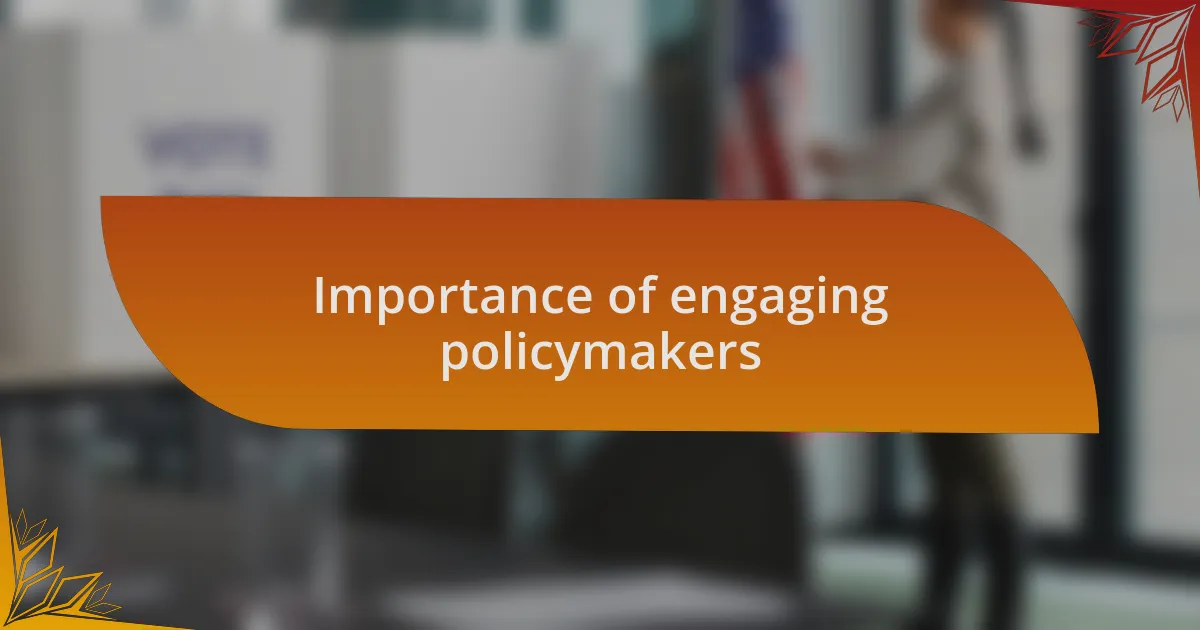
Importance of engaging policymakers
Engaging policymakers is critical as they hold the keys to enacting meaningful change. I recall sitting in a town hall meeting, feeling energized by advocates passionately discussing reparations. It struck me then that without involving these decision-makers, our collective efforts risk falling on deaf ears, essentially stalling progress.
The reality is that policymakers often shape the narrative surrounding reparations, influencing public opinion and funding opportunities. I remember a moment when an elected official, moved by a compelling personal story shared at a public forum, agreed to champion a reparations bill. It was a powerful reminder of the impact we can create when we connect the dots between advocacy and legislative action.
Moreover, engaging with policymakers fosters accountability, ensuring they listen to the voices of those most affected by historical injustices. This engagement can inspire a shift in their perspectives, as experienced when I accompanied a group to meet with a legislator who had previously been indifferent. Suddenly, the human stories we shared transformed his stance—highlighting that meaningful dialogues can bridge gaps and foster deeper understanding.
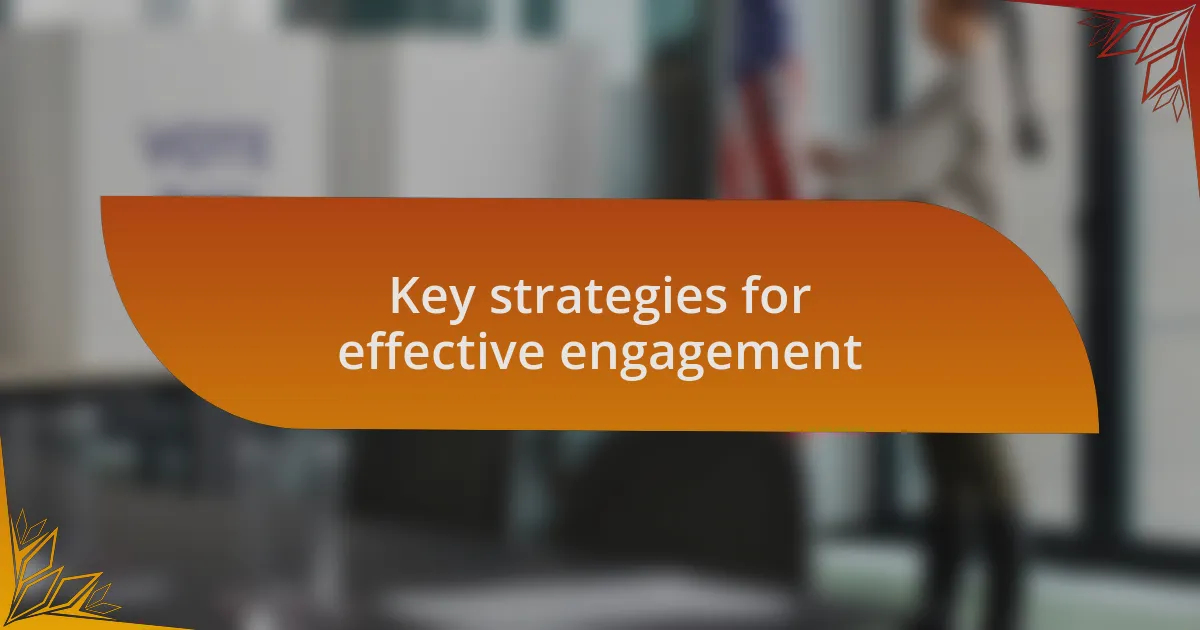
Key strategies for effective engagement
One effective strategy for engaging policymakers is to present data alongside personal stories. I once attended a meeting where an advocate shared heartbreaking accounts of families impacted by historical injustices, complemented by solid statistics on economic disparities. This combination created a compelling argument that left policymakers visibly moved, reinforcing the notion that engaging emotions can drive home the importance of legislative action. Have you ever noticed how numbers can feel abstract until they are tied to real lives?
Building coalitions is another vital approach. I remember when various organizations came together to form a united front for reparations. This unity not only amplified our voice but also showcased the widespread support for this cause. The strength found in collaboration can overcome the barriers that individual efforts often face, creating a sense of urgency and solidarity that resonates with policymakers. Could you imagine how much more powerful our collective message becomes?
Lastly, continuous follow-up engagement is crucial. After a meeting with a local official, I reached out to thank them for their time and shared a recent article highlighting relevant research. This simple gesture not only kept the conversation alive but also positioned us as ongoing partners rather than one-time advocates. Staying engaged shows that we are committed and that the issue is not going away. How often do you follow up with those you meet to maintain the momentum?
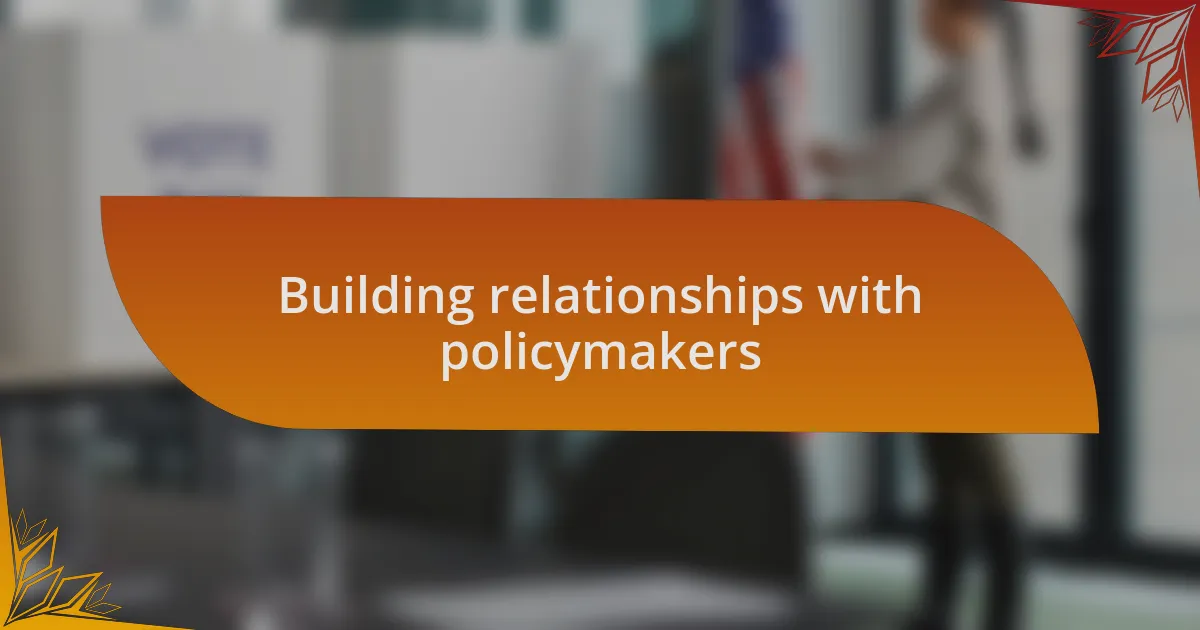
Building relationships with policymakers
Building relationships with policymakers requires a personal touch. I remember my first meeting with a congressperson who was initially skeptical about reparations. Instead of diving straight into policy discussions, I shared my family’s experiences and how historical injustices shaped our lives. I could see the shift in their demeanor; the human element made the issue resonate in a way that statistics alone never could. Have you ever felt that moment when someone finally understands your perspective?
Moreover, attending public events where policymakers are present can significantly enhance these relationships. At a town hall, I once had the chance to chat informally with an aide about the reparations movement. I learned that building rapport outside the formal settings allowed me to express my concerns more openly. It felt empowering to share my passion on a personal level. Isn’t it interesting how informal conversations can sometimes open doors that formal meetings do not?
Finally, showing gratitude and recognition to policymakers can strengthen these relationships further. After a significant policy speech, I took the time to write a heartfelt note of thanks, appreciating their openness to discussing reparations. That small gesture made a considerable difference; I found they were more receptive to future conversations. How often do you think about the impact of simply acknowledging someone’s efforts? It can transform an interaction into a lasting partnership.
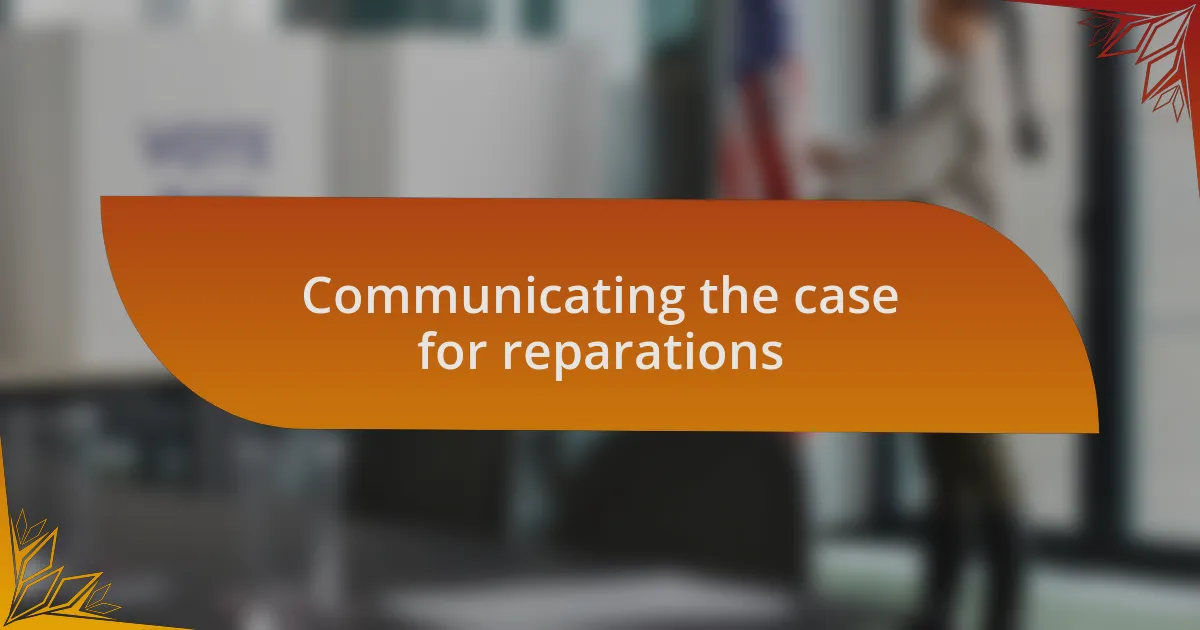
Communicating the case for reparations
Communicating the case for reparations effectively requires a blend of facts and storytelling. I recall a community meeting where I shared not just statistics but the lived experiences of people affected by systemic injustices. The audience was captivated; it’s remarkable how personal stories can illuminate the stark realities behind abstract concepts. Have you ever noticed how a single anecdote can change someone’s understanding?
Using clear and relatable language is essential when discussing reparations. I once presented a detailed proposal, but I found that simplifying complex terms led to stronger engagement. Instead of referring to “systemic discrimination,” I talked about its tangible impacts on families, homes, and futures. This approach sparked conversations that went beyond the data. How often have you felt lost in jargon when a simple story would have sufficed?
Another crucial aspect is to highlight the moral imperative behind reparations. During a panel discussion, I vividly described the emotional toll of historical injustices, urging policymakers to recognize their responsibility. This framing shifted the focus from mere policy to ethical obligation—a transformation I saw when several attendees expressed a newfound determination to advocate for reparations. Isn’t it fascinating how appealing to our sense of justice can be a powerful motivator for change?
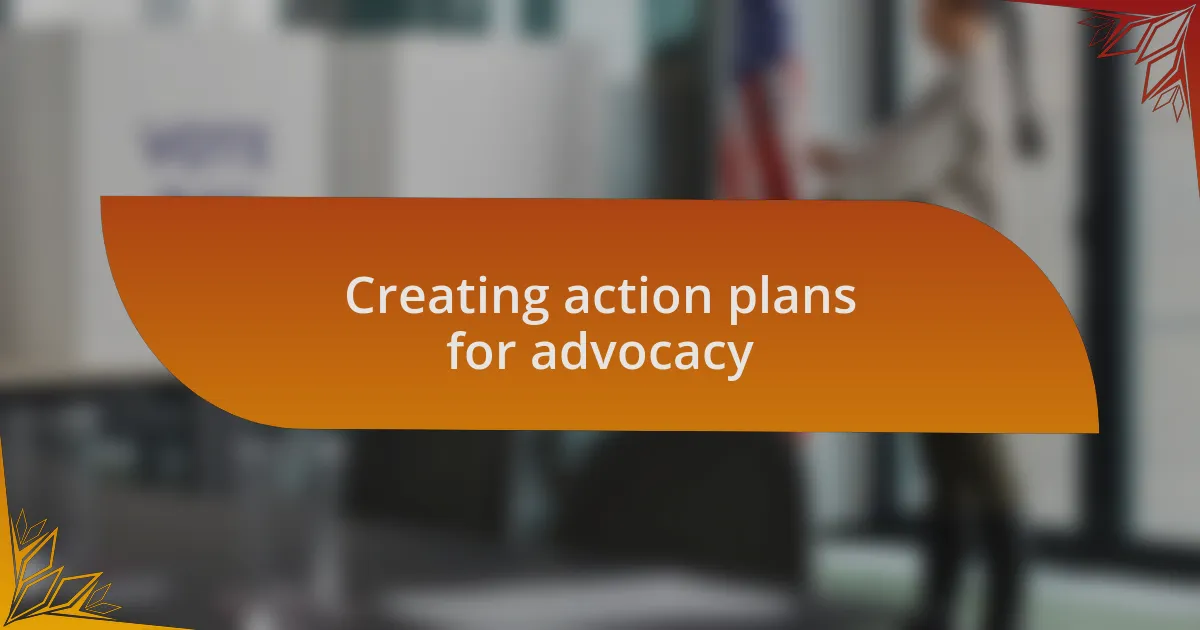
Creating action plans for advocacy
Creating an effective action plan for advocacy requires thorough preparation and an understanding of the relevant stakeholders. I recall a time when I mapped out key policymakers within my local government and their positions on reparations. This strategic approach not only helped me tailor my message but also ensured I connected with those most likely to champion our cause. Have you ever thought about how knowing the right people can significantly amplify your advocacy efforts?
Another essential element is setting clear, measurable goals that align with your advocacy mission. I remember working with a group to launch a campaign aimed at increasing awareness of reparations. We established milestones, like gathering community support and securing meetings with specific decision-makers. By focusing on achievable outcomes, we maintained momentum and kept our message clear. How often have you felt aimless in advocacy without defined targets?
Lastly, coalition-building is vital to strengthen advocacy efforts. When I collaborated with different community organizations, we discovered shared goals, creating a united front that made our voice louder. The synergy we built not only enriched our perspectives but also attracted more attention from policymakers. Don’t you think that when diverse groups rally around a cause, it becomes harder for decision-makers to ignore?